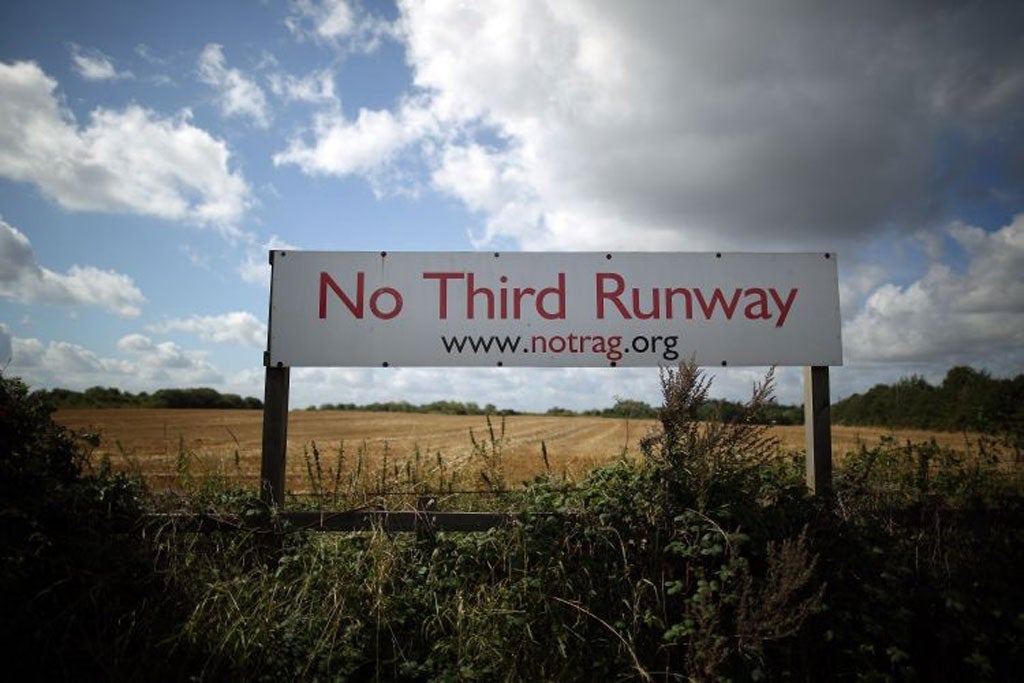Simon Calder: Plane preposterous - the airport debate is awash with tosh
The man who pays his way

Should you happen not to be the new Transport Secretary, stop reading now. On second thoughts, given that Patrick McLoughlin this week became the eighth incumbent of that office since May 2006, carry on. With an average tenure of under a year, there's a fair chance that you – or, heaven forbid, I – will ascend to the job before the decade is out.
Your main task: what do we do with a problem like Heathrow? Most transport secretaries stay just long enough to utter the phrase "Doing nothing is not an option", then do precisely that while they wait to be reshuffled out of the danger zone. But in the hope that the issue of airport capacity in south-east England may finally be addressed, allow me to accelerate the process by eliminating the more preposterous arguments advanced by lobbyists on all sides of the debate.
Exhibit one: a BBC London TV news report on Wednesday evening, which featured some angry residents of Putney – whose MP, Justine Greening, was replaced as Transport Secretary because of her consistent opposition to expansion at Heathrow. As lorries thundered past in the background, one woman complained: "The Olympics was horrendous already. You really thought the chimney stacks were coming off."
In the absence of a correction to the contrary, viewers were invited to conclude that, during the Games, the number of flights had increased. It had not. (Incidentally, I would be more interested in the lady's response to a question such as: "You were clearly born after 1946, when Heathrow opened – so who lured you to live beneath the flight path for Europe's busiest airport?")
No China crisis
The pro-expansion side, too, is awash with tosh. The organisation that consistently talks more nonsense than any other is the Greater London Authority, which is lobbying for a Thames Estuary airport. Here it is lamenting the way that London lags behind European competitors in serving emerging economies. London, we are told, "has only five flights per day to the whole of China". In contrast, Frankfurt has 10, Paris 11.
The reader may infer that Chinese entrepreneurs, indignant at the absence of flights from Guangzhou to Gatwick or Harbin to Heathrow, will instead conduct business only with the Germans or the French unless new capacity is built.
But if you define the whole of China as, well, the whole of China, the numbers don't stack up. Most days, London has 17 flights to the People's Republic – of which 10 land in Hong Kong, by far the most powerful draw in China. When "HKG" is included in the count, London becomes the European city with the best Chinese connections.
An uncontentious fact is that London serves far fewer destinations than its rivals: 162, according to the usually reliable Anna.aero analysis, compared with 277 from Frankfurt, 247 from Amsterdam and 236 from Paris. The differential was seized upon this week by Brian Donohoe, chair of the All-Party Parliamentary Aviation Group. It proved, he said, that "new routes to the emerging markets which represent the greatest economic potential to the UK, such as China and Brazil, cannot be opened up".
Oh yes, they can – it is just that the airlines serving Heathrow, in particular the dominant carrier, BA, prefer to use their precious slots to fly to a smaller number of destinations much more frequently. Today, for example, six flights depart from Heathrow for San Francisco, compared with three from Paris, two from Frankfurt and just one from Amsterdam. So concentrated are Heathrow's schedules that the departure boards of both Manchester and Gatwick offer far more destinations than the UK's leading airport.
But if you crave some exotic new gateway, then British Airways has some great news for you. Coming to Heathrow this winter, using slots acquired with the BMI takeover: those rising 21st-century economic powerhouses of Alicante, Rotterdam and Leeds/Bradford.
The Gulf widens
So much for the nonsense presented by interested parties on all sides. These are the three basics the new Transport Secretary needs to know.
Despite having no coherent aviation strategy for half a century, Britain is doing pretty well. London is still the world capital of aviation, with far more passengers arriving, departing and transferring than New York, Tokyo or Paris.
Heathrow is an incredibly complex machine that is switched on at 4.30am every morning and off at midnight, and works at full tilt every moment in between. Thanks to good organisation, and the world's best air traffic control, most of the time it works – making Heathrow easily the most efficient airport in the world. But when things go wrong, they unravel very quickly because there is no slack in the system.
The real competition that Heathrow faces is not from the usual suspects, Amsterdam, Frankfurt and Paris. The threat comes from the Gulf, whose rulers can build as many runways as they wish, and order squadrons of new jets that will fly over Europe as they connect East with West.
The Qantas chief executive, Alan Joyce, knows this. He has torn up the Australian airline's cosy partnership with BA to create, with Emirates, what he calls "the most comprehensive premium travel experience on the planet".
From April next year, Qantas flights to and from the UK will no longer refuel at Singapore but at Dubai – on track to supersede London as the world's aviation capital.
Join our commenting forum
Join thought-provoking conversations, follow other Independent readers and see their replies
Comments
Bookmark popover
Removed from bookmarks